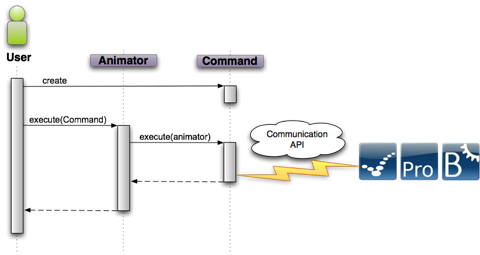ProB API: Difference between revisions
From Event-B
Jump to navigationJump to search
imported>Jens No edit summary |
imported>Jens No edit summary |
||
| Line 36: | Line 36: | ||
* Creates a tree structure representing the term | * Creates a tree structure representing the term | ||
** Convenient to create Data-Objects from a term | ** Convenient to create Data-Objects from a term | ||
==Command Example== | |||
* Direct usage of Prolog API | |||
* Getting the ID of the current state | |||
public final static String COMMAND = | |||
new PrologTermStringOutput().openTerm("getCurrentStateID"). | |||
printVariable("ID").closeTerm().fullstop().toString(); | |||
public void execute(Animator animator,IServerConnection connector) throws CoreException { | |||
synchronized (id) { | |||
Map<String, PrologTerm> bindings = BindingGenerator.createBinding(connector.sendCommand(COMMAND)); | |||
if (bindings == null) throw new CoreException("Prolog query failed."); | |||
id = bindings.get("ID").toString(); | |||
} | |||
} | |||
* Getting state information using other commands | |||
public synchronized void execute(final Animator animator,final IServerConnection connector) throws CoreException { | |||
final List<Operation> enabledOperations = GetEnabledOperationsCommand.getOperations(animator, stateId); | |||
final StateValuesResult stateValues = GetStateValuesCommand.getStateValues(animator, stateId); | |||
// [...] some more Command calls | |||
state = new State(stateId, initialised, invariantKo, timeoutOccured,maxOperationReached, stateValues, enabledOperations, errors); | |||
} | |||
Revision as of 08:08, 4 February 2009
ProB API
Animator
- Animator represents one run of ProB
- Currently: At most one Animator per file (might change)
- Each animator has at least one corresponding probcli
- Getting the Animator associated with a file: AnimatorRegistry.getAnimator(file)
ICommand
- A Command encapsulate a sequence of ProB (Prolog) queries
- Commands can be composed from other Commands, e.g. Exploring a state
- Get enabled events
- Get values for constants and variables
- Get other properties (Invariant violation, Timeout, ...)
Note: Exploration could also be implemented by a sequence of Prolog Queries. This is a design decision that depends on whether we want to reuse parts of the sequence or not
Some implemented basic commands
- Load Machine
- Explore a State (i.e. calculate sucessors, invariant, ...)
- Execute (i.e. observe) an Event
- Evaluate an Expression or Predicate
- Consistency Checking
- LTL Model Checking
Using the API
Most Commands have a static method to create and execute an instance in a single method call
Communication API
- Builder to create well formed Prolog Queries
- Communication Interface to send Queries to ProB
- Hides possible distributed calculation, i.e. "feels" like having a single ProB
- Parses the result from ProB (i.e. a Prolog term)
- Creates a tree structure representing the term
- Convenient to create Data-Objects from a term
Command Example
- Direct usage of Prolog API
- Getting the ID of the current state
public final static String COMMAND =
new PrologTermStringOutput().openTerm("getCurrentStateID").
printVariable("ID").closeTerm().fullstop().toString();
public void execute(Animator animator,IServerConnection connector) throws CoreException {
synchronized (id) {
Map<String, PrologTerm> bindings = BindingGenerator.createBinding(connector.sendCommand(COMMAND));
if (bindings == null) throw new CoreException("Prolog query failed.");
id = bindings.get("ID").toString();
}
}
- Getting state information using other commands
public synchronized void execute(final Animator animator,final IServerConnection connector) throws CoreException {
final List<Operation> enabledOperations = GetEnabledOperationsCommand.getOperations(animator, stateId);
final StateValuesResult stateValues = GetStateValuesCommand.getStateValues(animator, stateId);
// [...] some more Command calls
state = new State(stateId, initialised, invariantKo, timeoutOccured,maxOperationReached, stateValues, enabledOperations, errors);
}
